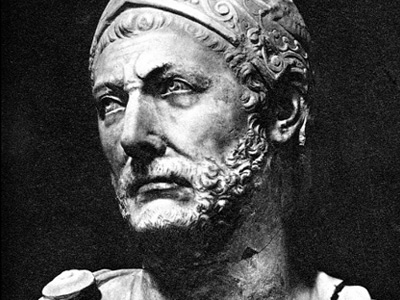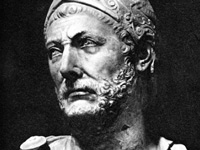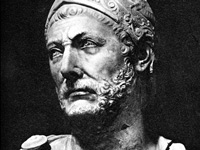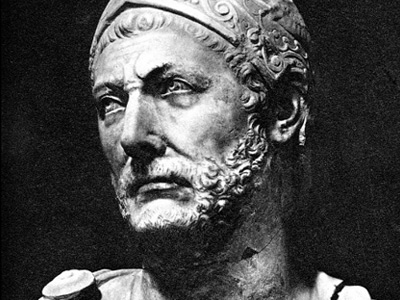Hannibal Barca (247-183 BC)

Legacy
Legacy to the Ancient World
Hannibal caused great distress to many in Roman society. Hannibal became such a figure of terror that whenever disaster struck, the Roman senators would exclaim "Hannibal ante portas" ("Hannibal is at the gates!") to express their fear or anxiety. This famous Latin phrase became a common expression that is often still used when a client arrives through the door or when one is faced with calamity.
The works of Roman writers such as Livy, Frontinus, and Juvenal show a grudging admiration for Hannibal Hannibal Barca (247-183 BC), was a Carthaginian general, considered one of the greatest military commanders in history. Hannibal lived during a period of great tension in the western Mediterranean Basin, when the Roman Republic established its supremacy over other great powers such as ancient Carthage. One of his most famous achievements was at the outbreak of the Second Punic War, when he marched an army which included war elephants from Iberia over the Pyrenees and the Alps into Italy. Hannibal Barca ». The Romans
Hannibal Barca (247-183 BC), was a Carthaginian general, considered one of the greatest military commanders in history. Hannibal lived during a period of great tension in the western Mediterranean Basin, when the Roman Republic established its supremacy over other great powers such as ancient Carthage. One of his most famous achievements was at the outbreak of the Second Punic War, when he marched an army which included war elephants from Iberia over the Pyrenees and the Alps into Italy. Hannibal Barca ». The Romans The Roman Republic was a form of government of Rome and the era of the classical Roman civilization when it was run through public representation of the Roman people. Beginning with the overthrow of the Roman Kingdom (traditionally dated to 509 BC) and ending in 27 BC with the establishment of the Roman Empire, Rome's control rapidly expanded during this period - from the city's immediate surroundings to hegemony over the entire Mediterranean world. even built statues of the Carthaginian in the very streets of Rome to advertise their defeat of such a worthy adversary. It is plausible to suggest that Hannibal engendered the greatest fear Rome had towards an enemy. Nevertheless, they grimly refused to admit the possibility of defeat and rejected all overtures for peace; they even refused to accept the ransom of prisoners after Cannae.
The Roman Republic was a form of government of Rome and the era of the classical Roman civilization when it was run through public representation of the Roman people. Beginning with the overthrow of the Roman Kingdom (traditionally dated to 509 BC) and ending in 27 BC with the establishment of the Roman Empire, Rome's control rapidly expanded during this period - from the city's immediate surroundings to hegemony over the entire Mediterranean world. even built statues of the Carthaginian in the very streets of Rome to advertise their defeat of such a worthy adversary. It is plausible to suggest that Hannibal engendered the greatest fear Rome had towards an enemy. Nevertheless, they grimly refused to admit the possibility of defeat and rejected all overtures for peace; they even refused to accept the ransom of prisoners after Cannae.
During the war there are no reports of revolutions among the Roman citizens, no factions with the Senate desiring peace, no pro-Carthaginian Roman turncoats, no coups. Indeed, throughout the war Roman aristocrats ferociously competed with each other for positions of command to fight against Rome's most dangerous enemy. Hannibal's military genius was not enough to really disturb the Roman political process and the collective political and military capacity of the Roman people. As Lazenby states,
It says volumes, too, for their political maturity and respect for constitutional forms that the complicated machinery of government continued to function even amidst disaster—there are few states in the ancient world in which a general who had lost a battle like Cannae would have dared to remain, let alone would have continued to be treated respectfully as head of state.
According to the historian Livy, the Romans feared Hannibal's military genius, and during Hannibal's march against Rome in 211 BC "a messenger who had travelled from Fregellae for a day and a night without stopping created great alarm in Rome, and the excitement was increased by people running about the City with wildly exaggerated accounts of the news he had brought. The wailing cry of the matrons was heard everywhere, not only in private houses but even in the temples. Here they knelt and swept the temple-floors with their dishevelled hair and lifted up their hands to heaven in piteous entreaty to the gods that they would deliver the City of Rome out of the hands of the enemy and preserve its mothers and children from injury and outrage." In the Senate the news was "received with varying feelings as men's temperaments differed," so it was decided to keep Capua under siege, but to send 15,000 infantry and 1,000 cavalry as reinforcements to Rome.
According to Livy, the land occupied by Hannibal's army outside Rome in 211 BC was sold at the very time of its occupation and for the same price. This may not be true but as Lazenby states, "could well be, exemplifying as it does not only the supreme confidence felt by the Romans in ultimate victory, but also the way in which something like normal life continued." After Cannae the Romans showed a considerable steadfastness in adversity. An undeniable proof of Rome's confidence is demonstrated by the fact that after the Cannae disaster she was left virtually defenseless, but the Senate still chose not to withdraw a single garrison from an overseas province to strengthen the city. In fact, they were reinforced and the campaigns there maintained until victory was secured; beginning first in Sicily under the direction of Claudius Marcellus, and later in Hispania under Scipio Africanus. Although the long-term consequences of Hannibal's war are debatable, this war was undeniably Rome's "finest hour".
Most of the sources available to historians about Hannibal are from Romans. They considered him the greatest enemy Rome had ever faced. Livy gives us the idea that he was extremely cruel. Even Cicero, when he talked of Rome and its two great enemies, spoke of the "honourable" Pyrrhus and the "cruel" Hannibal. Yet a different picture is sometimes revealed. When Hannibal's successes had brought about the death of two Roman consuls, he vainly searched for the body of Gaius Flaminius on the shores of Lake Trasimene, held ceremonial rituals in recognition of Lucius Aemilius Paullus, and sent Marcellus' ashes back to his family in Rome. Any bias attributed to Polybius, however, is more troublesome, since he was clearly sympathetic towards Hannibal. Nevertheless, Polybius spent a long period as a hostage in Italy and relied heavily on Roman sources, so there remains the possibility that he reproduced elements of Roman propaganda.
Military History
Hannibal is generally regarded as one of the best military strategists and tacticians of all time, the double envelopment at Cannae an enduring legacy of tactical brilliance. According to Appian, several years after the Second Punic War, Hannibal served as a political advisor in the Seleucid Kingdom and Scipio was sent there on a diplomatic mission from Rome.
It is said that at one of their meetings in the gymnasium Scipio and Hannibal had a conversation on the subject of generalship, in the presence of a number of bystanders, and that Scipio asked Hannibal whom he considered the greatest general, to which the latter replied, "Alexander of Macedonia".
To this Scipio assented since he also yielded the first place to Alexander. Then he asked Hannibal whom he placed next, and he replied, "Pyrrhus of Epirus", because he considered boldness the first qualification of a general; "for it would not be possible", he said, "to find two kings more enterprising than these".
Scipio was rather nettled by this, but nevertheless he asked Hannibal to whom he would give the third place, expecting that at least the third would be assigned to him; but Hannibal replied, "to myself; for when I was a young man I conquered Hispania and crossed the Alps with an army, the first after Hercules."
As Scipio saw that he was likely to prolong his self-laudation he said, laughing, "where would you place yourself, Hannibal, if you had not been defeated by me?" Hannibal, now perceiving his jealousy, replied, "in that case I should have put myself before Alexander". Thus Hannibal continued his self-laudation, but flattered Scipio in an indirect manner by suggesting that he had conquered one who was the superior of Alexander.
At the end of this conversation Hannibal invited Scipio to be his guest, and Scipio replied that he would be so gladly if Hannibal were not living with Antiochus, who was held in suspicion by the Romans. Thus did they, in a manner worthy of great commanders, cast aside their enmity at the end of their wars.
Military academies all over the world continue to study Hannibal's exploits, especially his victory at Cannae.
HISTORY

RESOURCES
This article uses material from the Wikipedia article "Hannibal Barca (247-183 BC)", which is released under the Creative Commons Attribution-Share-Alike License 3.0.
© Stories Preschool. All Rights Reserved.









